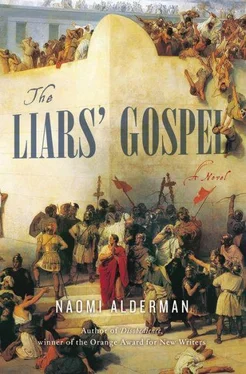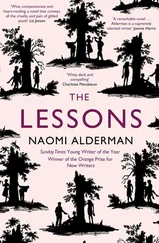“By the name of Yahaveh!” said Yehoshuah, and the people gasped, because this is the true name of God, which is never to be spoken aloud, except by the High Priest in the holiest place in the Temple in Jerusalem on Yom Kippur, the holiest day of the year, but Yehoshuah spoke it in this backwater village for the curing of one demon-infested man. “By the name of Yahaveh, come out of him!”
And hearing this forbidden name of power, the man’s whole body stiffened, his back arched and he let out a wild scream. The people said afterwards that they had never been more sure they heard a demon in all their days. In neighboring villages, they said they had heard that scream, five miles distant.
It lasted for the time of ten breaths, and everyone heard that it was the sound of the demon leaving the man’s body. Some said they saw black smoke rise up from his mouth, but Iehuda did not see it, only the clouds of dust he raised from his thrashing. But when the scream ended the man was still and it was obvious that the demon had left him.
A boy at the back of the crowd suddenly called out, “A snake!”
And they turned, terrified, expecting a giant snake, a demon the size of a man. But it was just a mottled viper, lazily coiled behind some rocks.
“The demon has gone into it!” shouted someone, and another boy picked up a stone and threw it at the snake. Then more and more pelted it, and though it arched its back and bared its fangs just like the demon-haunted man had done, it could not win against so many and soon enough it was dead.
They brought the limp, crushed snake to the man, dangling it by its tail. He was sitting up now and blinking, probing his bitten tongue with one finger as the bloody saliva spilled from his mouth. Though the demon was gone from him, he was not as a normal man — no one could expect it — he seemed dazed, and frowned and muttered, but he did not growl or hiss any longer. He blinked at the snake as they laid it beside him.
“That was your demon,” said one of them. “Burn it and you will be free forever.”
But Yehoshuah smiled and clasped the man’s hand.
“Your faith in God and in His holy name has set you free,” he said.
That night the village killed three yearling goats to feed them. And the next morning, when they walked on, more than ten men and women of the village came with them.
There had been others traveling with Yehoshuah before Iehuda arrived, but Iehuda knew that he was special to him. Yehoshuah could tell him things the others could not understand.
After Yehoshuah had taken the snake demon out of the man in Kfar Nachum, they sat up talking long after the others were sleeping the sleep of those whose bellies are filled with roasted goat.
“How does God tell you,” said Iehuda, “which to cure?”
Yehoshuah thumbed the edge of his sleeping blanket.
“I can see,” he said, “which demons will listen to me.”
Iehuda lay back on his own blanket.
“I knew a man in Qeriot ran mad with a demon,” he said. “He would dash his head against walls.”
“Demons make men do such things,” said Yehoshuah.
“But when his mother spoke to him,” said Iehuda, “he became calm. For a while. It was only after she died that the demon would not let him be. He died of that demon, but while his mother was alive he could hearken to her voice and not the demon’s.”
Yehoshuah stirred the embers of the fire with a stick.
“Is it like that with you?” said Iehuda.
Yehoshuah shrugged. “I do not understand what you are asking me.”
“If a demon listens to a man’s mother,” Iehuda said, “it is not because the mother has power over the demon. The mother has power over the man. The name you spoke today has power over all men. Not just demons, but men as well.”
Yehoshuah threw back his head and laughed.
“This questioning is the wisdom I taught you,” he said. “Use it always with me. You are right. I do not know how I do what I do. When I speak, the demons may listen, but what happens next is in God’s hands.”
They walked on and their host became bigger. Mighty. A multitude. There started to be another group too, among those who came to hear Yehoshuah speak, or watch him doing his cures and casting out demons. They were the other rabbis. They were only to be expected. They came to wrestle with him.
Some met him boldly. In Emek, Ezra the Teacher challenged him to debate and after they had finished calling one another fools Ezra held Yehoshuah close to his breast and brought them all in for supper. In Me’etz, they set up two great piles of stones and had Yehoshuah and their own teacher, Nechemiah, preach atop them. In Refek, the people asked Yehoshuah questions in turn until his patience was utterly exhausted and he cried out that no man could bear such an assault without a cask of wine.
They tried to trip him up, and find the flaw, and winkle out his hidden assumptions and specious reasoning. For Iehuda, these were the most glorious days. Everyone knew that the debates were the “arguments for the sake of heaven” of which the sages speak with praise.
The more a man argues with you, the more he respects you. The more he tries to pick holes in your argument, the gladder is the Holy One Who is in All Places. The great rabbis Hillel and Shammai argued with each other so fiercely that their followers attacked one another bodily — several of their students were killed in these fights. And though this is to be regretted, their ardor for debate is commendable. For how are we to hear the infinitely stranded voice of God except in the grappling voices of those who care about the Torah and seek out its never fully graspable truth?
Some rabbis were merely angry, of course. Lesser men and weak men. Every part of the world contains men who cannot bear to hear their words questioned. They are people who believe that only their purple robe or their silver chain gives them power over others. They forget that Moses had only a staff of wood and stuttered when he spoke. And there were such men in Yehoshuah’s camp too — some of his followers could not bear to hear him questioned, just as some of the rabbis could not bear to hear his criticism.
But the best men on each side rejoiced in the fight, chewing on the muscle of it, crunching at the bones of it. And when the arguments were done, in the light of early dawn, more men and more women walked on with them to the next village, and the next.
It was about this time that there started to be twelve of them. The closest ones, the inner circle. Iehuda would not have imagined that the group could grow so large as to need an inner circle, but it had done so. They needed to exclude the provocateurs in their midst sowing dissent or spying for Rome. There were spies, of course. Yehoshuah needed trusted men.
He came to each of them separately, whispering that he had need of their counsel, their eyes and ears. It took Iehuda a little time to work out who the other trusted men were. He noticed that, although there had been many questioners in the outer circle, he was the only one in that inner group who had been known to argue back, to challenge in open meeting.
There had been a time when they made no distinctions. At Beit Saida, when everyone had shared a single meal, Yehoshuah had seemed to be saying that all distinctions would be swept away. But now Iehuda was the only speck of dissent left in the inner circle. He could not speak to the others.
“Do you know what they are saying of you?” he asked.
Yehoshuah frowned, but said nothing. They were alone, by the fire. It was late at night and the others were asleep. It was like it had been at the start. There were not enough such nights now.
“They are saying that you are the Messiah. The one we wait for. The true son of David. The one who will end all disease and suffering. The one whose arrival we will know because there will be no more war and all the dead will rise from the grave.”
Читать дальше












